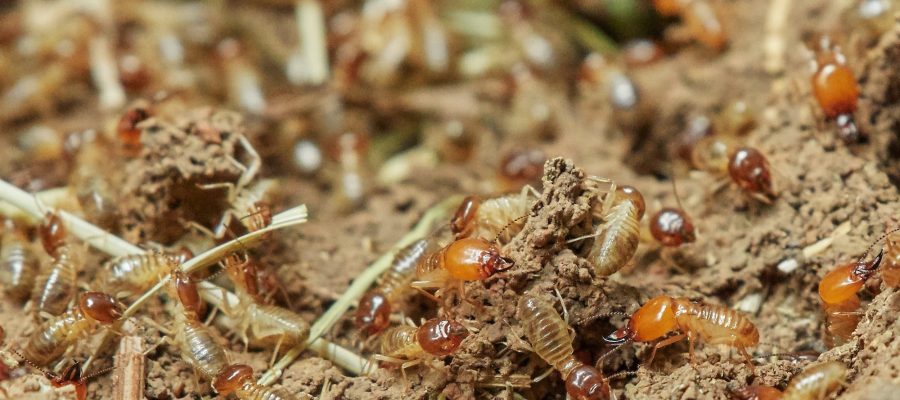Bug Off: 5 Effective Ways to Get Rid of Termites in Garden
- September 4, 2020
- in Pest Control
- by Ashley Dando

Termites are more than a nuisance in your home.
If you notice termites in garden settings, it’s easy to panic. Termites are naturally occurring in soils.
Once you’ve found termites in the garden, that means they’ve found a food source. Termites feed on cellulose existent in wood and plant roots.
Termites will stay hidden when first spreading. Especially in an outdoor setting, seeing termites in the larval stage is difficult. However, once they’ve grown, termites are attracted to light sources and will be active in a garden setting.
That means if you’re planning to build a wooden structure near the garden, termite-resistant wood is a good idea.
If you’re dead set on getting rid of termites in your garden, we have you covered. Here are five of the most effective ways to get rid of termites that have infiltrated your space.
Damp spaces are hot spots for termites.
If you’re a homeowner, you need to keep damp wood and areas at a minimum across your yard. A damp location is the preferred climate for termites.
Wherever moisture collects, termites will be there. Hot spots like logs, branches, kid’s toys, or other backyard items are all threats. If you want more of a barrier between termites, your garden, and eventually your home, install a liquid termite barrier.
Although they’re found at the base of most home foundations, these barriers can be used on wooden structures, woodpiles, and tree stumps. This barrier is also sprayed to kill termites on contact.
Termites often gather near the gutters of your home. That means the down-spout extenders (although used to divert the termites away from the foundation) could force them toward your garden.
Make sure you’re keeping an eye out for pooling water across your yard and garden.
Naturally occurring roundworms known as nematodes can kill termites.
Because of their gut bacterium, nematodes are an effective natural insecticide. A microscopic organism, once a nematode enters a termite’s body the process is underway. The release of the bacteria mentioned poisons the termite’s blood and slowly kills them.
Nematodes live in a variety of habitats and are easy to find. They’re 100 percent natural, not causing harm to humans, pets, or plants.
Once a nematode is introduced, the process will be long-lasting. They’ll breed and continue multiplying keeping termites at bay for weeks. This process can happen in as little as 24 to 48 hours when they’re first released.
Even if termites aren’t your biggest threat, nematodes can kill tons of other common household pests.
Available in a powder mixture, boric acid is one of the best ways to get rid of insects.
The acid complicates a termite’s digestive and metabolic system. After prolonged exposure, the termite will eventually die. This takes about three to seven days on average.
If you’re not keen on the use of insecticides, don’t worry. Boric acid is one of the less toxic insecticides in comparison to the competition.
The process starts with a simple concoction of boric acid powder, sugar, and water to attract the termites. Once they’ve started moving the acid back to the colony, they’ll die off entirely.
Make sure you’re using goggles and a dust mask when preparing a boric acid concoction. You can also spray the boric acid powder onto any place you might think there’s an infestation.
Continue whatever process you choose for three to five days and keep an eye out for other developments.
If you know what not to do when dealing with termites you’ll be in good hands.
The issue with termite removal is knowing the best way to begin. Without proper information, you’ll waste money and time. Avoid using over the counter insect spray, pine sleepers, and relocation methods.
Insect spray will kill your plants, but it won’t do a good job of killing the termites. Termites on the surface might be affected by this process, but your problem is deeper.
If you have a true termite infestation you’ll need to kill the colony at its roots, buried deep in the soil. Without addressing that first, more termites will come to the surface.
Pine sleepers are also not advised.
Treated with arsenic, pine sleepers are toxic. Once watered the arsenic will seep into the soil and food you might be growing in your garden. Without knowing you could be poisoning yourself instead of the termites.
Removing termites won’t solve the problem either.
If you’re dealing with an infestation you won’t know how far the colony has buried itself. Although you thought you removed them from the property, termites travel well.
You could create a bigger issue with relocation resulting in termites infecting another part of your home or yard.
If all else fails, put your trust in the hands of a professional.
Pest control is the best solution when locating a termite problem and exterminating them. Penetrating the nests with the right chemicals and precautions is important.
Without proper treatment, your infestation could spread from termites in garden settings to the home.
If your infestation of termites in garden settings increases, call a professional. These critters are difficult to contain, that’s why businesses like Safeguard Pest Control has trained professionals.
Established in 1989, Safeguard has been providing services across the Sunshine Coast for decades. For 30 years, they’ve built a close-knit and experienced team that is committed to getting the job done right the first time.
Safeguard provides a full range of pest control services for homeowners, businesses, hospitals, schools — you name it.
If you want more information on services, give Safeguard a call today. You’ll be glad you did.
Array